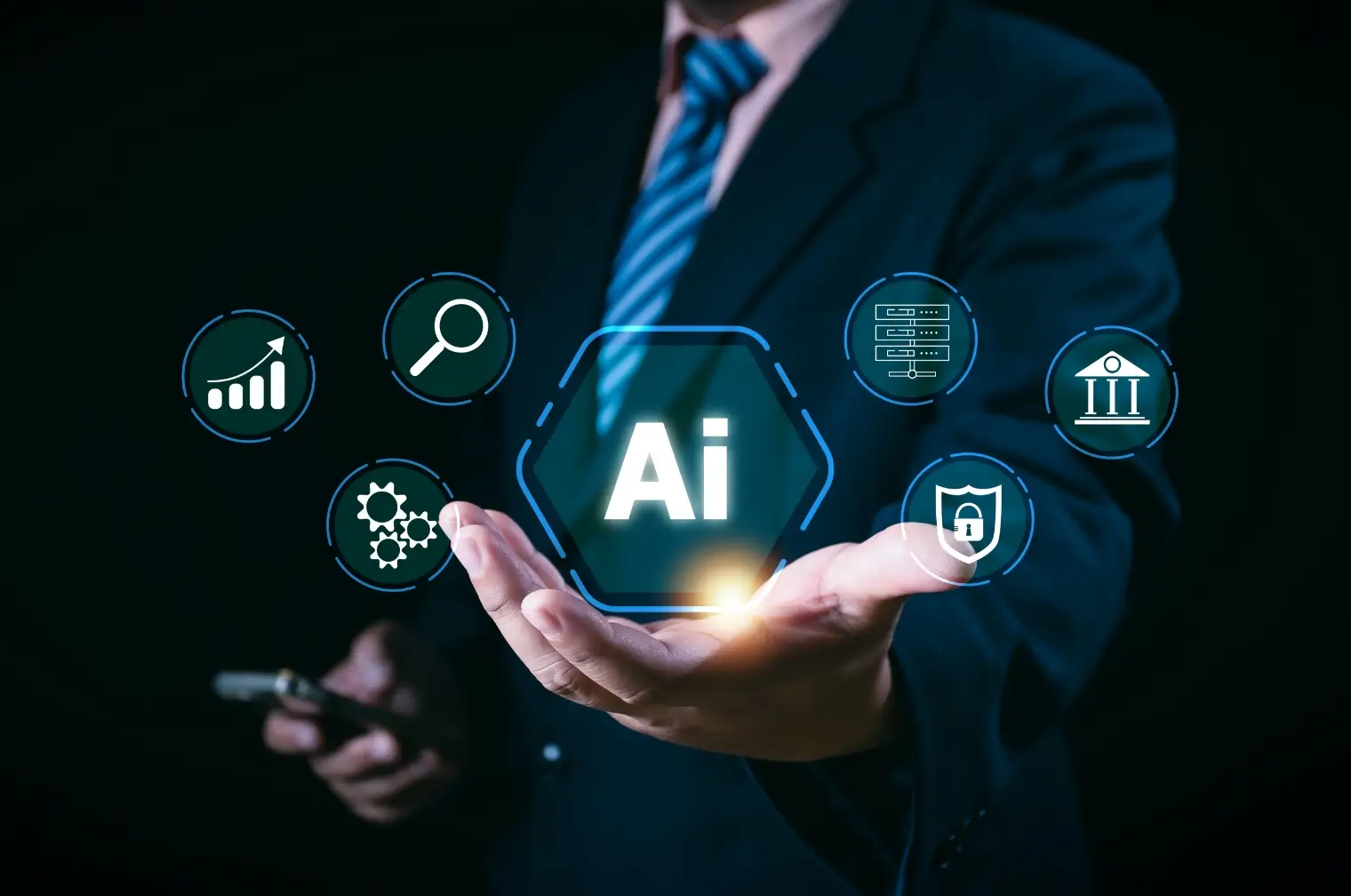Machine Learning and AI for revolution of Tech Companies are changing and streamlining businesses.
It goes without saying that end-to-end AI product engineering is fundamentally transforming how companies conceptualize, develop, and launch products. This approach to product development is becoming imperative for businesses seeking to remain competitive.
End-to-end AI product engineering integrates artificial intelligence throughout the entire product development lifecycle, from initial concept ideation to market deployment, dramatically compressing timeframes while enhancing quality and innovation. With the global AI market projected to reach $1,811.75 billion by 2030, organizations are embracing end-to-end AI product engineering to overcome the traditional barriers of prolonged development cycles.
This approach is revolutionizing time-to-market strategies, enabling businesses to respond swiftly to changing customer demands and market conditions while delivering products that truly resonate with users.
AI-Powered Product Development Lifecycle
Traditional product development cycles—often extending over 12 to 18 months—struggle to keep pace with evolving consumer demands and technological advancements. By the time a product reaches the market, shifts in consumer preferences may render it less relevant, leading to missed opportunities and diminished returns. End-to-end AI product engineering addresses this challenge by reimagining the entire product development lifecycle.
Artificial intelligence is bringing five fundamental changes to the software product development lifecycle (PDLC) that profoundly impact speed, quality, value, and overall innovation.
These changes include:
- Significantly faster time to market: AI automates time-consuming routine tasks such as project management, market analysis, performance testing, and documentation, freeing product teams to focus on higher-value activities requiring human creativity and judgment.
- Earlier delivery of customer value: AI integrates fragmented data sources of customer feedback and product usage into the development cycle, making it possible to build products in an accelerated manner linked to customer value from the outset.
- More efficient idea testing: AI eliminates the strict dividing line between planning and prototyping, enabling quick validation of various hypotheses and identifying promising ideas through rapid experimentation.
- Enhanced data-driven decision making: AI reduces subjectivity in product development by providing unbiased analysis of data sets, helping business leaders make more informed strategy and prioritization decisions.
- Continuous improvement cycles: AI facilitates ongoing monitoring of metrics and evaluation of progress, enabling faster adaptation to market feedback.
This AI-powered transformation is reshaping every phase of product development, from discovery and viability testing to building, deploying, and scaling.
Read: How AI-First Software and Platforms are Transforming Businesses
Transform Your Vision into Reality with Our AI Product Engineering Expertise
Partner with ViitorCloud to develop innovative AI solutions that accelerate your time-to-market and drive business growth.
Key Benefits: Speed, Quality, and Cost Optimization
The integration of end-to-end AI product engineering delivers three primary advantages that are revolutionizing time-to-market strategies: accelerated development, enhanced quality, and optimized costs.
Accelerated Development and Deployment
Studies show that AI implementation can accelerate product time to market by 5-20%. According to empirical data, utilizing AI tools shortens the product launch cycle to just 4 months, compared to 5 months using traditional methods.
This acceleration comes from:
- Automated code generation and testing, which streamlines development workflows
- AI-driven project management that identifies potential bottlenecks before they occur
- Rapid prototyping and simulation that condenses the testing phase
- Automated quality assurance that speeds up the validation process
Enhanced Product Quality and Performance
End-to-end AI product engineering significantly improves product quality by:
- Spotting potential defects early in the development lifecycle through machine learning algorithms
- Ensuring superior product performance standards through constant AI-powered testing
- Analyzing vast amounts of data to identify patterns and insights that human engineers might miss
- Simulating product usage under various conditions to identify potential issues before release
Cost Optimization and Operational Efficiency
AI-enabled automation translates into substantial cost savings through:
- Optimized resource allocation across the product development lifecycle
- Reduction in predictable cost overruns through predictive analytics
- Less waste and rework due to automated testing and quality control
- More efficient allocation of human resources to high-value creative tasks
These benefits collectively enable organizations to bring better products to market faster and more efficiently than ever before.
Check: Data Engineering in Healthcare: Unlocking the Power of Predictive Analytics
Traditional Product Development Challenges
Traditional product development methodologies often encounter several significant obstacles that end-to-end AI product engineering effectively addresses:
- Delayed Market Fit: Extended development timelines frequently result in products that no longer align with current consumer desires upon release. AI-powered development enables faster adaptation to market changes and user feedback, ensuring greater relevance at launch.
- Elevated Costs: Traditional engineering, design, and testing phases contribute to increased financial burdens. AI automation reduces these costs by streamlining processes and minimizing redundant work.
- Slow Feedback Loops: Post-launch customer feedback collection and subsequent iterations are typically time-consuming in conventional development approaches. AI accelerates these loops by automatically processing feedback and suggesting improvements.
- Scaling Difficulties: Products developed without adaptive, AI-driven frameworks often face obstacles when scaling to meet growing demand. End-to-end AI product engineering builds scalability into the product architecture from the beginning.
- Integration Complexities: Adding AI to legacy systems can be challenging and may require significant modifications. However, using tools like APIs (application programming interfaces) can ease this transition and reduce disruptions.
By addressing these fundamental challenges, end-to-end AI product engineering enables organizations to overcome traditional barriers to rapid, successful product development and deployment.
Accelerate Your Product Development with Expert Product Engineering Services
Leverage our comprehensive product engineering services to bring your AI-driven products to market faster and more efficiently.
The Data Advantage: AI-Driven Decision-Making in Product Engineering
A critical aspect of end-to-end AI product engineering is its ability to transform vast amounts of data into actionable insights throughout the development process. This data-driven approach represents a paradigm shift from traditional decision-making methods that often relied on intuition, limited market research, or the highest-paid person’s opinion (HiPPO).
AI systems excel at:
- Analyzing market trends: Processing massive datasets to identify emerging patterns and opportunities that might be missed by human analysts
- Understanding customer needs: Combining data from multiple sources, including social media, support tickets, and usage telemetry, to build a comprehensive picture of user expectations
- Predicting product performance: Using simulation and predictive modeling to forecast how products will perform under various conditions
- Optimizing design decisions: Evaluating thousands of potential design variations to identify optimal solutions based on predefined criteria
This data advantage is particularly evident in how AI reduces subjectivity in decision-making. By leveraging AI to process and analyze data at scale, organizations can make more informed decisions at every stage of the product engineering process, increasing the likelihood of market success.
Also Read: Vertical AI Agents for Real Estate Market Analysis: Applications, Use Cases, and Impact
How to Implement End-to-End AI Product Engineering
Successfully implementing end-to-end AI product engineering requires a strategic approach that addresses key considerations and follows best practices:
1. Ensure Data Quality and Availability
AI depends on large volumes of high-quality data. Organizations should establish robust data governance frameworks to ensure their data is clean, accurate, and accessible. Bad or incomplete data can lead to errors and suboptimal outcomes.
2. Address Security and Compliance
Product security is paramount when implementing AI. Generative AI can sometimes be tricked into providing harmful answers or accidentally revealing private information. Organizations should employ strong security measures like encryption, safe data handling, and regular security audits.
3. Balance Human and AI Collaboration
The most successful implementations of end-to-end AI product engineering maintain a balanced approach that combines AI capabilities with human expertise. This collaboration leverages AI for routine tasks while preserving human creativity and judgment for strategic decisions.
4. Focus on Scalability
Real-time performance can be a challenge for AI models that require significant computing power. To ensure scalability, companies should consider optimizing models, reducing their size when possible, and employing edge computing where appropriate.
5. Adopt Incremental Implementation
Rather than attempting a complete overhaul of existing systems, organizations should consider starting with smaller AI initiatives and gradually expanding their scope. This approach reduces disruption and allows for learning and adjustment throughout the implementation process.
6. Prioritize Continuous Learning and Improvement
AI systems should be designed to learn and improve continuously based on new data and feedback. This ongoing evolution ensures that the product engineering process becomes increasingly efficient and effective over time.
By following these best practices, organizations can maximize the benefits of end-to-end AI product engineering while minimizing potential risks and challenges.
Also Check: The Role of Digital Product Engineering in Logistics Innovation
Unlock Business Potential with Tailored AI Solutions
Discover how our customized AI solutions can revolutionize your product offerings and enhance customer satisfaction.
ViitorCloud as Your Partner for End-to-End AI Product Engineering Solutions
ViitorCloud specializes in providing comprehensive end-to-end AI product engineering services that empower businesses to innovate and address real problems effectively. Our expertise in technologies like generative AI, AR/VR integration, blockchain solutions, and cloud services makes businesses future-ready in today’s competitive landscape.
We help our clients co-create transformative solutions tailored to their unique needs by promoting innovation through iterative operational models and long-term partnerships. Our professional AI team integrates artificial intelligence into business processes, enhances efficiency, and helps with decision-making across the entire product development lifecycle.
Our end-to-end AI product engineering approach includes:
- Custom generative AI solutions designed to transform your digital product engineering workflows
- AI-driven automation that accelerates development cycles and reduces time-to-market
- Data analytics capabilities that turn information into actionable insights
- Robust security frameworks that protect your intellectual property and customer data
Whether you are looking to optimize your workflows or innovate new products, our custom AI solutions and extensive experience in digital product engineering services empower your business to achieve faster time-to-market, enhanced user experiences, and scalable growth.
Contact us now and get instant consultation from our AI experts.
Final Words
Thus, end-to-end AI product engineering is fundamentally reshaping how products are developed and brought to market. By integrating AI throughout the entire product lifecycle, organizations can significantly accelerate time-to-market while enhancing quality and reducing costs. This approach delivers tangible benefits across industries and applications.
The future belongs to organizations that can effectively harness AI to transform their product development processes and deliver exceptional value to customers with unprecedented speed and precision. So, take action now and get professional guidance and AI product engineering services from ViitorCloud.









